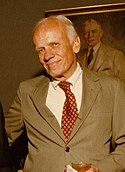Walker Percy Quote
You are a member of the first generation of doctors in the history of medicine to turn their backs on the oath of Hippocrates and kill millions of old useless people, unborn children, born malformed children, for the good of mankind —and to do so without a single murmur from one of you. Not a single letter of protest in the august New England Journal of Medicine. And do you know what you’re going to end up doing? You a graduate of Harvard and a reader of the New York Times and a member of the Ford Foundation’s Program for the Third World? Do you know what is going to happen to you? . . . You’re going to end up killing Jews.
Walker Percy
You are a member of the first generation of doctors in the history of medicine to turn their backs on the oath of Hippocrates and kill millions of old useless people, unborn children, born malformed children, for the good of mankind —and to do so without a single murmur from one of you. Not a single letter of protest in the august New England Journal of Medicine. And do you know what you’re going to end up doing? You a graduate of Harvard and a reader of the New York Times and a member of the Ford Foundation’s Program for the Third World? Do you know what is going to happen to you? . . . You’re going to end up killing Jews.
Tags:
eugenics, medical ethics
Related Quotes
The world today has 6.8 billion people. That's heading up to about nine billion. Now if we do a really great job on new vaccines, health care & reproductive health services, we could LOWER that by per...
Bill Gates
Tags:
anti vaccine, bilderberg, depopulation, eugenics, evil, evil men, evil people, genocide, global elite, health care
About Walker Percy
Walker Percy, OblSB (May 28, 1916 – May 10, 1990) was an American writer whose interests included philosophy and semiotics. Percy is noted for his philosophical novels set in and around New Orleans; his first, The Moviegoer, won the National Book Award for Fiction.
Trained as a physician at Columbia University, Percy decided to become a writer after a bout of tuberculosis. He devoted his literary life to the exploration of "the dislocation of man in the modern age." His work displays a combination of existential questioning, Southern sensibility, and deep Catholic faith. He had a lifelong friendship with author and historian Shelby Foote and spent much of his life in Covington, Louisiana, where he died of prostate cancer in 1990.
Trained as a physician at Columbia University, Percy decided to become a writer after a bout of tuberculosis. He devoted his literary life to the exploration of "the dislocation of man in the modern age." His work displays a combination of existential questioning, Southern sensibility, and deep Catholic faith. He had a lifelong friendship with author and historian Shelby Foote and spent much of his life in Covington, Louisiana, where he died of prostate cancer in 1990.
